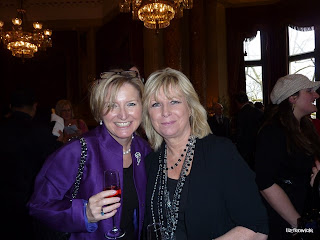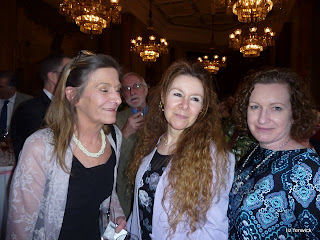 A warm welcome to Evonne Wareham, who is a contender for the 2012 Joan Hessayon Award. Many congratulations on your shortlisting, Evonne. Please tell us about your novel and how you came to write it?
A warm welcome to Evonne Wareham, who is a contender for the 2012 Joan Hessayon Award. Many congratulations on your shortlisting, Evonne. Please tell us about your novel and how you came to write it? Can you work anywhere, or do you have a favourite place to hide away and write?
I'm one of those old-fashioned types who writes the first draft with pen and paper. So as long as I can balance the pad on my knee and see to scribble, I can do it just about anywhere. I do write quite a lot on trains -- part of the attraction of travelling from Wales to London for RNA events is the four hours uninterrupted writing time on the train. When I was working full
 -time the morning commute was the only time I could carve out of the day to write and I was only managing about 200 words. I was quite depressed about it, until a colleague, who was himself a well-regarded biographer, pointed out that at the end of the week -- 5 days -- I had a thousand words. So my advice to anyone struggling to make their word count is to write when you get the opportunity and it will eventually mount up.
-time the morning commute was the only time I could carve out of the day to write and I was only managing about 200 words. I was quite depressed about it, until a colleague, who was himself a well-regarded biographer, pointed out that at the end of the week -- 5 days -- I had a thousand words. So my advice to anyone struggling to make their word count is to write when you get the opportunity and it will eventually mount up.What point of view do you most enjoy writing: first person or third? Can you say why that is?
Mostly I like to write in the third person. My books include the point of view of both hero and heroine, as Choc-Lit are very keen for the hero to have a voice. I find it very rewarding to write romance from both points of view, instead of only hearing from the heroine. For the thriller plot, writing from the hero’s POV is essential, as he is the one stalking the villain in derelict buildings in the early hours of the morning, leaving the heroine safely tucked up in bed! I also include both the hero and heroine’s thoughts, so it gets quite involved. I have been known to write in the first person. Usually it’s my villain, talking directly to the reader. Not quite sure what that says about how my mind works.
Have you had rejections, and if so, how did you deal with them?
Have you had rejections, and if so, how did you deal with them?
Hah! Many, and varied, from the terse one-liner to the five-star rejection letter, one that gives you feedback on your work from a professional and is actually to be cherished, once you’ve got over the disappointment. There’s not much you can do except dust yourself down and take note of anything that is said that you can use, improve or correct. One of the comments on my work, which I treasure, was given to me by an editor as feedback in a competition, so it wasn't actually a rejection letter. She compared my writing to that of Meg Gardiner, one of my favorite thriller writers. I was delighted when I met Meg at an event last year, and she agreed to give me a cover quote for Never Coming Home, which is now adorning the back of the book.
Do you use prologues or epilogues? Do you like flashbacks?
I know that people have strong feelings about prologues and some agents and editors will not countenance them. Never Coming Home has a prologue, because a key event, a fatal car crash, happens six months before the main action. Devlin, the hero of the book, becomes involved, simply by being in the wrong place at the wrong time. I’ve never used an epilogue, but I must admit that as a reader I do have a weakness for short scenes at the end of a romance that show hero and heroine actually enjoying their Happy Ever After. Flashbacks are not always easy to handle. I'm currently experimenting with re-writing an early novel so that it has a middle section which will be an extended flashback, showing the hero and heroine when they were in their teens -- I'm hoping it will work, as I love the story.
Which do you find the hardest part of the novel to write, and how do you cope when the going gets tough?
Having been in the New Writers’ Scheme for a number of years, I have a drawer full of completed and partial manuscripts, and I found with all of them that there was at least one point where I hit a wall. As I've usually got a strong idea of how I want the book to end, focusing on that usually gets me through. I find that sometimes, after you've stalled, the characters have a surprise waiting for you, something you didn't know you were going to write. Maybe the pause is time for your subconscious to sort out where the book is going.
Is a sense of place important to your writing? How do you set about researching it?
Location and the sense of place are very important to me. I like to say that I write books set in glamorous locations. In common with a lot of other members of the Romantic Novelists’ Association, I count Mary Stewart as one of my literary influences and many of her romances were set in Europe -- places that must have been impossibly exotic in the austere times when she was writing, in the years after the Second World War. So Europe features in my books too, and London, where I lived for nearly 20 years, and I also like to set a least one scene in my native Wales. I try to use places that I've visited and as I don’t much like flying, that rules out long haul destinations. The Internet is invaluable for reminders of how a place looks. I love those virtual tours that take you along streets and inside buildings.
Are you involved in any writing related tasks other than the actual writing or promoting your writing?
I’ve always had jobs that involved producing reports, minutes and briefing papers, which sometimes left very little room in my head for creating romance. At the moment my ‘day job’ is studying for a doctorate in history, which involves writing an academic thesis. It is a very different style, and I have had remarks made about my history reading like a romantic novel. My response to that is just to smile. As long as it doesn't start working in the other direction …
Tell us about your first acceptance and what you hope to write next?
Never Coming Home is my debut, but I'm pleased to say that Choc-Lit have also accepted my second novel, which was also a finalist in the American Title competition. It's a paranormal story called Out of Sight, Out of Mind -- not the paws, claws, fangs, fins type of paranormal, but a romantic thriller that features two human protagonists who happen to read minds -- with all the problems that might bring. I had a great time writing it and it will be out from Choc-lit in March 2013. After that? I’m re-working a favourite story that went off the rails and got put into a bottom drawer and I’m also doing in-depth research for what I call my treasure hunt book – missing paintings, a Victorian mystery, cryptic clues and any number of dead bodies. Lots of research about art and the Arthurian legends, which is keeping me busy.
If you won the Award how would you celebrate your success?
I have no idea. I’ve waited a long time to be in the award line up and haven’t thought any further than that.
What is the mantra that has helps you to maintain faith in yourself?
If you won the Award how would you celebrate your success?
I have no idea. I’ve waited a long time to be in the award line up and haven’t thought any further than that.
What is the mantra that has helps you to maintain faith in yourself?
Patience is a virtue.
Who is your favourite hero and why?
Athos from Dumas’s Three Musketeers – a man of action, with a mysterious and possibly tragic past. Still a good pattern for the hero of a modern thriller.
Please share with us your favourite recipe.
Writing for Choc-lit, it should probably be a chocolate recipe, but any chocolate that gets into the house doesn't last long enough to be cooked! This recipe is courtesy of the Glamorgan Archives, who found it in a notebook dated 1795 – 1813, belonging to John Perkins, a gentleman farmer, of Ty-draw, Llantrithyd in the Vale of Glamorgan. Not exactly what we would call healthy eating.
To make sausages Take a pound of lean pork and the same amount of ‘fatt’. Mix in a marble morter and season with salt, cloves, mace, pepper, ginger and a ‘little sage’. Bind together with 4 egg yolks and 1 egg white and roll up ‘in what form you please'.
Thank you for talking to us, Evonne. We wish you success with ‘Never Coming Home’ and the Joan Hessayon Award.









































































.JPG)